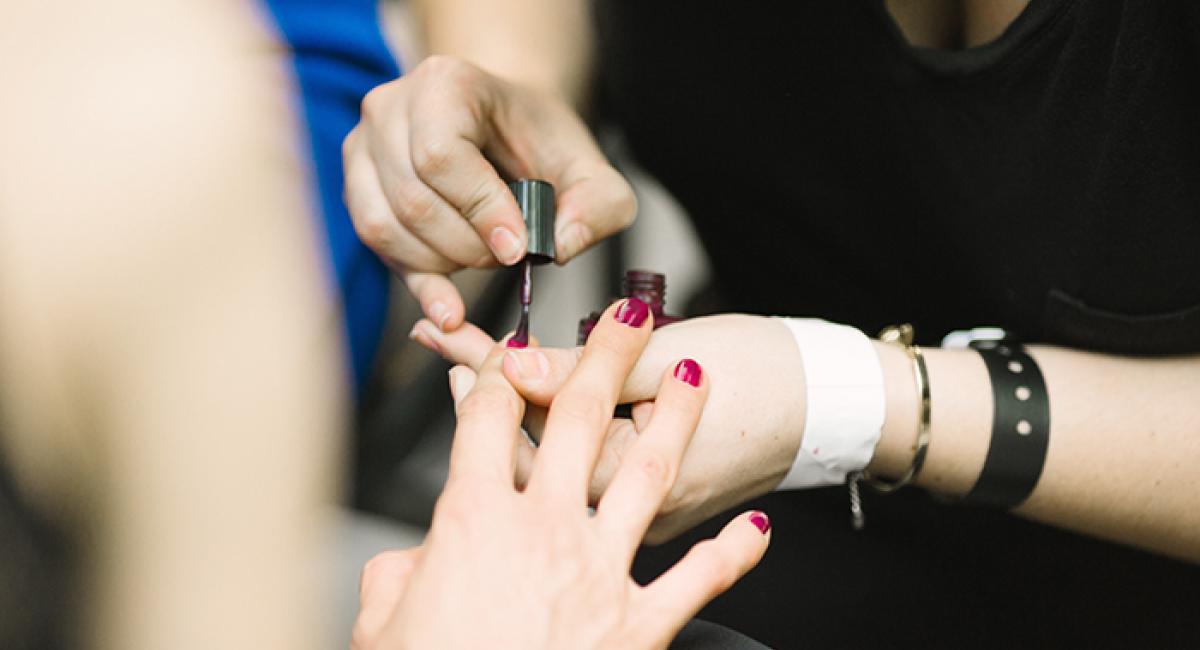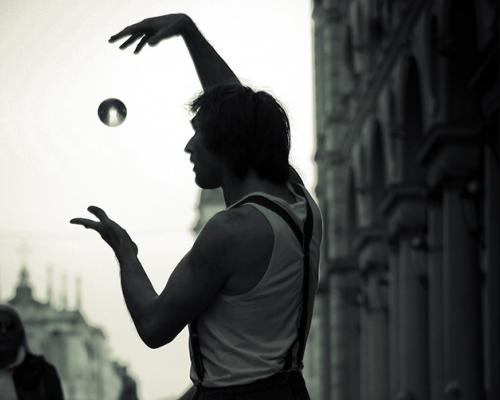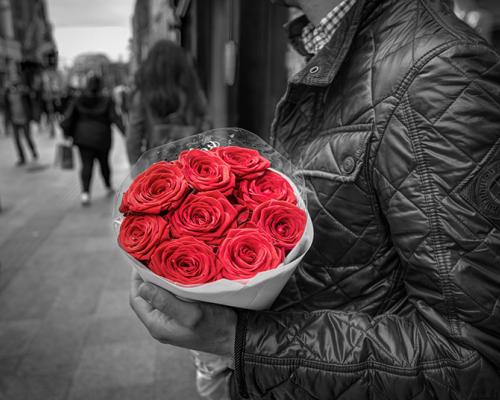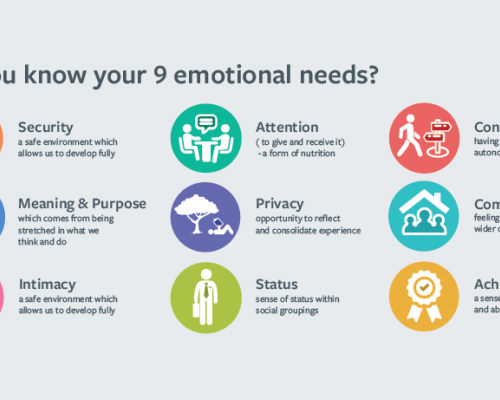Beautiful outside and in
Lee Pycroft describes how a beauty makeover can trigger self-care and self-respect in vulnerable or traumatised women.
THE woman was in her late 40s. With a sigh, she plonked herself down heavily in the chair opposite me and said that she didn’t bother with make up anymore, as there was no point: she had advanced cervical cancer. I was at a hospice at a MY-Makeover event, where I and a few other beauty professionals use our expertise to help patients enjoy a relaxing and confidence-boosting experience, as we do their makeup, style their hair and paint their nails. I looked at the woman across from me and saw someone for whom all sense of significance, status, and meaning and purpose had diminished. “Well, perhaps you will let me show you that there can be a point,” I said, smiling. 
In an attempt to help her focus on positives, I asked her what she used to enjoy doing and she immediately mentioned spending time with her husband and children. Gently sweeping my make-up brush across her face, I steered her away from worry talk about how they would manage without her by directing her attention to the here and now of her experience: “Can you feel the softness of this brush as it strokes your skin? I wonder if the sensation is more relaxing when I am stroking around your eyes or down your cheeks.”
As she began to relax, I said I imagined she had given her children a lot of love, skills and joyful occasions they would always be able to draw on and invited her to share some of those happy memories with me. As she talked, I asked for more detail, to encourage her to really feel herself into those memories. At the end, when she opened her eyes and looked in the mirror, she saw her face shimmering with a healthy glow, her eyes accentuated with a smoky look and her lips glossy, and she gasped in pleasure. She decided that she wanted pictures taken with her family that evening, so that they would always have the memory of how alive and shining she had looked that day, even so close to the end. Most importantly, she realised that she could still do things that had significance – creating powerful new memories to leave behind her was a gift she could give even today. “Thank you so, so much,” she said.
My training in human givens was what enabled all this. It has brought much added richness to what I can deliver through MY-Makeover, the initiative I began nearly five years ago, to give women struggling with or overwhelmed by current difficulties the chance to experience feeling good about themselves through the simple mechanism of a make-up session. I didn’t realise it at the time but I do realise now how this ticks the box for so many emotional needs and can sometimes have profound consequences. 
After training as a make-up artist in my 20s, I had worked hard, met the right people and made the right impression, becoming, in time, well respected within the industry and a spokesperson for different beauty brands. I worked with supermodels and celebrities and on TV and generally experienced my life as exciting, filled with variety and exotic travel. I can see now, looking back, that a strong need for status, leading to acceptance by others, drove me, for I didn’t feel good inside myself. So when personal events overtook – the break-up of the relationship with my child’s father, becoming a single parent and sole provider, a follow-on dysfunctional relationship, which ended badly, and then the death of my mother – I sank into depression. At the time I could hardly explain what was happening to me. Now I recognise the depression was the result of a sequence of challenging events which I lacked the mental tools to deal with. I also recognise now that I had taken on my mother’s tendency to catastrophise and had an idealised view of relationships, expecting them to remain blissfully romantic – as that was the impression I had of my own parents’ relationship, despite its tempestuous nature.
I was on antidepressants, still sunk in gloom, when, one evening, I saw a TED talk in which I heard the speaker say that we all need to do something that gives a sense of meaning to our lives. He looked directly at the camera (it felt as if he was looking directly at me) and said, “What do you hold in your hand that you could give to others?” That one sentence broke through my depressive trance and I realised I literally had something in my hands: the skill in my fingers to make people look and feel better. A new charity running drop-in centres for women victims of domestic violence had already asked me, as a celebrity make-up artist, to be an ambassador for them, as they were offering makeovers on a small scale. I realised I didn’t just want to be the figurehead; I wanted to do the work. So I started going into the centres, fully equipped with the tools of my trade. And that is certainly what got me out of depression. As I worked with people who had suffered so many traumatic experiences, I could clearly see the contrast with my own life and recognised what had been my destructive self-absorption and black-and-white thinking.
The message
On the afternoon of one New Year’s Eve, a young woman came into the centre where we were offering a session. She was so heavily made up that her face looked almost distorted, leaving the real her hidden; her arms bore the marks of repeated self-harm. As I worked on her, first gently removing the layers of heavy foundation, powders, mascara and eyeliner, she told me that she had been raped on multiple occasions by her violent partner, who had now been given a 14-year prison sentence. As I gave her the glamorous (but more natural) look which she wanted, she kept saying, “Things are a mess”. So I repeated to her something that someone had said to me: “Sometimes your mess can be your message”. She loved her new look and afterwards wrote to me saying that she had gone out that night with friends for the first time in months. “I felt so good about myself, so different!” she said. It was at that point that I wondered whether what I had to offer could be so much more than a fleeting feel-good factor, if I learned how to deliver the ‘message’ more effectively, making the best possible use of my brief encounters. That was when I started studying the human givens approach.
At around the same time, I set up the MY-Makeover initiative, because the original charity had had to close. I receive funding from a foundation that has enabled me to extend my reach, help more charities and bring in more beauty professionals. I can now call on 20 make-up artists, all very happy to help for a nominal fee. Currently we run monthly London events for Maggie’s (which offers support to people with cancer, their families and friends); Solace (which works with women and children victims of domestic and sexual abuse); Holy Cross Centre Trust (working with socially excluded people); Help for Heroes; two London hospices and The Good Grief Trust. Every quarter, I plan a more ambitious event for one of these, offering up to 40 people an afternoon of complimentary hair styling, makeup, manicures, pedicures and massage, with goody bags of products (negotiated from product brands) to take home.
Meeting so many needs
These larger events so clearly meet multiple needs, particularly for community, connection, attention and status. Many who attend are isolated one way or another, perhaps because of going through trauma, being stuck in an abusive relationship, coping with complex cancer treatment or living the restricted life of a carer. When people going through suffering come together, all at different stages in their experience, the dynamic in the room just instantly changes up. Very many have not received therapeutic touch for a very long time, and we are able to give it in an unthreatening way by stroking their faces with brushes, combing their hair or painting their nails, all while giving undivided attention. The combined power of touch and attention can be amazing to receive, when touch and attention have previously felt dangerous or associated with negative events. Of course, we are giving women at the same time a sense of control, as they choose their hairstyles, their make-up hues and nail polish colours.
A more valuable service
Knowing the structure of emotional needs and innate resources helps me deliver a much more valuable service now. As well as lowering emotional arousal through attention and touch, I know I can also have an important impact with the very words I choose to use. It is not unusual to see tears streaming down the face of someone who is having their hair or make-up done, because the experience quite overcomes them. If I am walking around the room and spot this, I will sit down next to that person while the treatment continues, mirror the way they are sitting and the tone of their voice, and listen to them. I know to listen for the strengths and resources that reveal themselves in their stories and feed them back, remembering the power of that little word ‘and’: “It has been so hard for you and you have still shown up today”. It is wonderful to see people’s faces change after I have offered a reframe, talking, for instance, of how they had kept their children safe when they have been describing themselves as useless parents. “Yes,” someone may reflect, as a result, “I am a good mum. I have stayed focused on my kids and I have always helped them with their homework, no matter what might be happening with their dad.” I value the skill set I have acquired to enable me to guide someone’s focus away from the trials of their day-to-day life onto whatever might be going right for them.
A lot of women arrive in a highly aroused state. They emanate a chaotic energy and their stress levels are so high that often just making the short journey to wherever we are holding the event leaves them tearful or irritable. (This is particularly the case for those who come to the drop-in centres, as they are still in abusive relationships, thus not yet in a place of safety; those we see in women’s refuges are much calmer because they have made the decision to take back control.) At one event, put on by the Good Grief Trust for victims of the appalling Grenfell Tower fire, one woman arrived full of anger and resentment about injustice. She was a struggling single mother of three children, cranky with everyone about everything. I went to her and, mirroring her strong body language and tone of voice, I said, “I can really see why you are so angry right now!” Then, softening my tone and using the ever powerful ‘and’, I led her gently into the heart of the room, saying, “and let me show you the wonderful range of treatments we have on offer for you today.” By the end of her treatments, she had morphed from agitated and cranky into extremely relaxed and grateful. As she left, she said to me, “Massive respect. I feel incredible. I haven’t had this kind of care and attention for years.”
Non-invasive
I know that what I am now delivering, from the human givens approach, is not only more powerful and strategic but also not invasive. People don’t even know I am doing it. Rather than going to someone for help or being put in the role of a patient, people come for a ‘feel-good’ experience. It is pampering, not practical. That can help lower emotional arousal in itself and everything else can then easily be smuggled in.
It never ceases to amaze and thrill me that small things can have such a large impact. One woman told me that she went out and bought some nail varnish after our session: such a nothing event in my own life and a huge step for her, symbolic of her recognition that she was worthy of self-care. It was the first time she had bought something ‘unnecessary’ for herself in years. Imprinted on my memory is another woman, whom I met while we were packing up at the end of a makeover at a hospice. She was brought out of her room in a wheelchair, which her husband was pushing, and her face had a startled expression etched on it, as if just leaving her room made her highly anxious. Her skin was pale and her body was bloated; she was in the terminal stages of a cancer.
I left off packing up and went and knelt alongside her, trying to think how I could focus her on something she had found pleasure in. I told her how much I enjoyed the work we had been doing today and asked her what kinds of thing she had done that she had enjoyed. She told me, in a very soft voice, that she had been a TV producer. This gave us a point of contact, as I had worked on TV shows. She then told me, with a smile, how when she was working she had always chosen to wear a particular blue nail polish; it was her personal trademark. I invited her to pick out a similar colour from my range of polishes, and she found the right one instantly. And there and then, I painted it onto her nails. Afterwards, her face was shining with pleasure: “It has been lovely to have this experience. I don’t have things like this done for me anymore.” She died two weeks later and the hospice manager told me that she had particularly wanted me to know how much she had valued the nail-polishing and talking about her life. It was a small thing, yet also it was huge. 
And it isn’t just women who can benefit. When we started work with Help for Heroes, we were concentrated on its Band of Sisters arm, which supports carer partners of veterans. Our afternoons offer them a brief respite from their caring role. However, I decided that we should have the men along to an event too, as it would give a couple a chance to bond anew in an unstrained, light-hearted environment, helping meet needs for connection, intimacy and fun. The men got their hair cut, their nails filed and buffed, and their feet massaged, while their partners got the rest of the works. It was great to see burly ex-soldiers laughing, their big bare feet planted in bowls of scented water. I had arranged for there to be accessories like silly hats and feather boas aplenty, so couples could have amusing pictures taken after their treatments. One man said he hadn’t left the house in an age because of PTSD and he was so glad he had come; it was wonderful both to see his wife having a good time, and for him to meet up with old friends, he told me. He felt safe in the environment because he was with his peers, people who all understood.
I never tire of seeing the shift in people and their emotional patterns. They arrive in one emotional state and leave in completely another, and even if their different outlook is only temporary, they know now that they can feel different. It gives them hope – just as happens, in guided imagery, when we give a depressed person the experience that things can be different.
Exhausted by pain
After learning guided imagery through Human Givens College, I was able to put it to use myself with a woman soldier who had badly injured her back on a training exercise a few years before and had since been signed off. I met her first at a Help for Heroes function, where she told me that she lived alone and was constantly exhausted by pain. Later she came to one of our events and, by this time, I knew about guided imagery and how to use it to help with pain. I was able to do a brief induction and suggest she give her pain a colour and try moving it and changing its shape, so that she could take some control. I also taught her how to focus her breathing and use it to calm herself. We didn’t have long and we were in a crowded room, but I felt I had been able to give her something valuable to take away.
The more I learn and understand about the human givens approach, the more cohesive and ‘joined up’ our events become. For instance, it was because I became mindful of the need for privacy that I introduced massage as an option when working at domestic violence refuges, where women are commonly crowded in. Massages, in a separate private section, give them time and space for quiet, even though they have no idea an important need is being met. Conversely, providing the makeovers in a different venue can be powerful, and start to increase feelings of wider security. I have found that the women from the refuges, all from different ethnic groups and accompanied by excitable children, are understandably very cautious and anxious about being out of their safe zone. I found a lovely venue nearby and its freshness, natural light and uplifting view of greenery and trees, along with the treatments being offered, quickly helped them to start to relax, accept that they were in another safe place, and that there could be more safe places for them.
No miracles
Of course, we don’t do miracles and people have to go back to their troubled lives afterwards. One Iraqi woman at the Grenfell Tower event told me how she had been shot and her brother killed in an attack when she was younger, and the Grenfell tower had re-traumatised her; to compound that, she was also living with an abusive partner. I sat with her, taught her 7:11 breathing and asked her if she could imagine a private special place where she could feel comforted. She was living temporarily in a hotel and chose her room there, with her children beside her (it was perhaps telling that there was nowhere else). I helped her build a picture of it, getting her to ‘look around’ and to ‘feel’ the texture of her children’s hair, etc. I was able to tell her that even calming herself just a little, like this, would help her, because when we are completely over-stressed we cannot come up with solutions to even simple difficulties. Of course, her problems were huge but her shoulders dropped and her breathing slowed and she told me it was the best therapy she had ever had. Although I could do no more, I was at least able to flag her up to the Good Grief Trust, who could then signpost her to further help.
We received a lovely message some months later from another woman who attended the Grenfell event. She said that, whenever she applied a lipstick from the goody bag she was given at the end, she remembered how peaceful she had felt at the event and wanted to thank us for the experience. 
The whole package
I fit all this in with earning a living and I do it with gratitude, unfailingly moved by the people I meet, as it is what gives my own life much of its purpose. I want to help more people to see and experience how something as seemingly trivial as beauty care can, in fact, represent self-care, which in turn supports emotional wellbeing, particularly for those for whom it is in short supply.
So I do whatever I can to spread the message. I used the platform of an article in Marie Claire magazine during one Domestic Violence Awareness Month to spread the idea of hope and recovery by showing women who had been in abusive relationships beautifully made up, laughing and empowered, instead of as victims. I hope to add in short talks at the MY-Makeover events, to teach people the simple tools they can use to help themselves lower emotional arousal. On my social media accounts I regularly post one-minute videos called “Pockets of Wisdom”, which are tools and techniques for a variety of life challenges, and I include many of the HG teachings within them. I get a lot of positive feedback and it is a great way of spreading the message of how we can help ourselves and others.
I believe we can feel beautiful outside and in. I spent years delivering just the first part, and now, thanks to my understandings from human givens, I can deliver the whole package.
Lee Pycroft has worked as a makeup artist for 25 years with A-list celebrities and headed the make-up team for TV’s Britain’s Next Top Model. She founded and runs a groundbreaking initiative called MY-Makeover, which uses beauty and makeup as a form of self-care to help boost self esteem and emotional wellbeing in vulnerable sectors of society. Currently MYMakeover works alongside eight different charities, creating bespoke events for their guests. See www.Leepycroft.co.uk
The pictures in this article were taken at a MYMakeover event for Help the Heroes.
Latest Tweets:
Tweets by humangivensLatest News:
HG practitioner participates in global congress
HG practitioner Felicity Jaffrey, who lives and works in Egypt, received the extraordinary honour of being invited to speak at Egypt’s hugely prestigious Global Congress on Population, Health and Human Development (PHDC24) in Cairo in October.
SCoPEd - latest update
The six SCoPEd partners have published their latest update on the important work currently underway with regards to the SCoPEd framework implementation, governance and impact assessment.
Date posted: 14/02/2024














